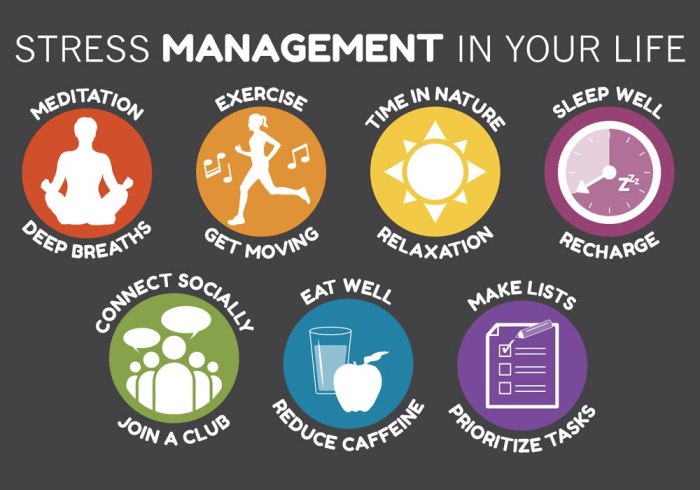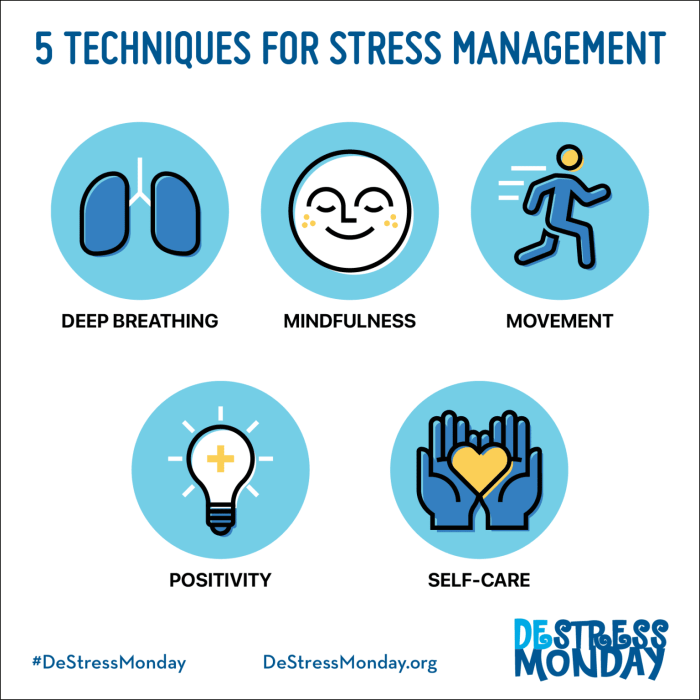Stress Management Tips: Get ready to dive into the world of managing stress like a pro with these essential tips that will change your life. From identifying stress triggers to practicing mindfulness and relaxation techniques, we’ve got you covered. Let’s kick stress to the curb!
Introduction to Stress Management Tips
Stress management is the practice of utilizing techniques and strategies to reduce and cope with the pressures of everyday life. It involves recognizing stress triggers, finding healthy ways to deal with stress, and improving overall well-being.
Stress management is important for overall well-being because prolonged stress can have negative effects on both physical and mental health. High levels of stress can lead to anxiety, depression, heart disease, and other serious health issues. By learning how to manage stress effectively, individuals can improve their quality of life and reduce the risk of developing stress-related illnesses.
Benefits of Implementing Stress Management Techniques
- Improved mental health: Managing stress can help reduce symptoms of anxiety and depression, leading to better overall mental well-being.
- Enhanced physical health: Lowering stress levels can have a positive impact on physical health, reducing the risk of heart disease, high blood pressure, and other health conditions.
- Better relationships: By managing stress, individuals can improve their communication skills and better handle conflicts in relationships.
- Increased productivity: Effective stress management can help individuals focus better, stay organized, and be more productive in their daily tasks.
- Overall well-being: Implementing stress management techniques can lead to a greater sense of balance, happiness, and fulfillment in life.
Identifying Stress Triggers: Stress Management Tips
Identifying stress triggers is crucial in managing stress effectively. By recognizing the factors that contribute to your stress, you can take proactive steps to address them and minimize their impact on your well-being.
Common Stress Triggers
Stress triggers can vary from person to person, but some common ones include:
- Work pressure and deadlines
- Relationship issues
- Financial problems
- Health concerns
- Major life changes
External and Internal Stressors
External stressors are factors in your environment that cause stress, such as work, relationships, or financial issues. Internal stressors, on the other hand, stem from within yourself, like negative self-talk, perfectionism, or unrealistic expectations.
Benefits of Identifying Stress Triggers
By pinpointing the specific triggers of your stress, you can develop coping mechanisms and strategies to deal with them effectively. This self-awareness allows you to take control of your stress levels and implement healthy habits to manage stress in a more productive way.
Healthy Lifestyle Practices for Stress Management

Maintaining a healthy lifestyle is crucial for effectively managing stress. By incorporating relaxation techniques, regular exercise, and proper nutrition into your daily routine, you can significantly reduce stress levels and improve your overall well-being.
Activities Promoting Relaxation
- Practice deep breathing exercises to calm your mind and body.
- Engage in mindfulness meditation to focus on the present moment and alleviate stress.
- Take a warm bath or shower to relax your muscles and unwind after a long day.
- Listen to soothing music or nature sounds to create a peaceful environment.
Importance of Regular Exercise
Regular physical activity is essential for managing stress as it helps release endorphins, also known as “feel-good” hormones, which can elevate your mood and reduce stress levels. Exercise also provides a distraction from daily worries and improves overall physical health, contributing to a sense of well-being.
Role of Nutrition in Managing Stress Levels
Proper nutrition plays a significant role in managing stress levels. Consuming a well-balanced diet rich in fruits, vegetables, whole grains, and lean proteins provides your body with essential nutrients that support overall health and reduce the impact of stress. Avoiding excessive caffeine, sugar, and processed foods can also help stabilize energy levels and mood.
Mindfulness and Relaxation Techniques
Mindfulness involves being fully present in the moment and aware of your thoughts, feelings, and surroundings. It can help reduce stress by allowing you to focus on the present rather than worrying about the past or future.
Deep Breathing
Deep breathing is a simple and effective relaxation technique that can help calm your mind and body. Start by taking slow, deep breaths in through your nose, allowing your belly to rise, and then exhaling slowly through your mouth. Repeat this for a few minutes to help reduce stress and promote relaxation.
Meditation, Stress Management Tips
Meditation involves focusing your mind and eliminating distractions to achieve a state of calm and clarity. Find a quiet place, sit or lie down comfortably, and close your eyes. Focus on your breath or a calming image, and let go of any negative thoughts or stressors. Practice meditation regularly to improve your overall sense of well-being.
Progressive Muscle Relaxation
Progressive muscle relaxation involves tensing and then relaxing different muscle groups in your body to release physical tension and promote relaxation. Start by tensing your muscles for a few seconds, then slowly release the tension while focusing on the sensation of relaxation. Move through each muscle group, from your toes to your head, to help relieve stress and improve your physical and mental well-being.
Incorporating Mindfulness Practices into Daily Routines
To incorporate mindfulness practices into your daily routine, try starting your day with a few minutes of deep breathing or meditation to set a positive tone for the day. Throughout the day, take short breaks to check in with yourself, practice deep breathing, or engage in mindful activities like walking or eating. Before bed, try progressive muscle relaxation to help unwind and prepare for a restful night’s sleep.
Time Management Strategies

Effective time management is crucial for reducing stress levels. Poor time management can lead to missed deadlines, increased workload, and a constant feeling of being overwhelmed. By implementing effective time management strategies, individuals can better prioritize tasks, allocate time efficiently, and ultimately reduce stress in their daily lives.
Set Priorities and Create a Schedule
- Identify the most important tasks and prioritize them accordingly.
- Create a daily or weekly schedule to allocate time for each task.
- Use tools like planners or digital calendars to help stay organized.
Avoid Multitasking
- Focus on one task at a time to improve efficiency and reduce stress.
- Avoid switching between tasks, as it can lead to decreased productivity.
Delegate Tasks
- Recognize when tasks can be delegated to others to lighten your workload.
- Delegate tasks based on individual strengths and expertise.
Utilize Time Management Apps
- Explore apps like Trello, Todoist, or Google Calendar to help organize tasks and deadlines.
- Set reminders and notifications to stay on track with your schedule.
Social Support and Communication
Building a strong support system and practicing open communication are crucial aspects of effective stress management. Having positive relationships and a network of people to rely on can significantly reduce feelings of stress and anxiety.
Importance of Social Support
- Strong social support can provide emotional comfort, practical help, and a sense of belonging.
- It can boost self-esteem, confidence, and overall well-being.
- Having someone to talk to and share experiences with can alleviate feelings of isolation and loneliness.
Role of Open Communication
- Open communication fosters trust and understanding in relationships, reducing misunderstandings and conflicts that can contribute to stress.
- Expressing thoughts and feelings openly can help release pent-up emotions and prevent them from escalating into stressors.
- Listening actively and empathetically to others can strengthen bonds and create a supportive environment.
Tips for Building Positive Relationships
- Make time for social activities and connect with friends and family regularly.
- Be a good listener and offer support to others in times of need.
- Communicate openly and honestly, expressing your needs and boundaries clearly.
- Avoid toxic relationships and surround yourself with positive influences.
- Join groups or communities with shared interests to expand your social circle.